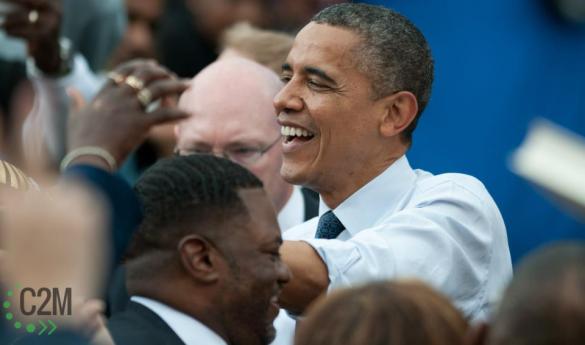Mason students and professors speculate on back-to-back Obama rallies
In the final month of the 2012 election, President Barack Obama held two campaign rallies within a two-week period at George Mason University. Obama has visited Mason a total of six times since first announcing his campaign for president in 2007. As the election season comes to a close, Mason students and professors speculate on Obama’s northern Virginia campaign strategy.
“Virginia is pretty much the most prominent swing state in the Electoral College right now, so if he wins Virginia there’s a really good chance that he wins the whole election,” said Megan Adamczewski, a junior and president of the Mason Democrats. “He keeps coming back to Fairfax because Fairfax is the pivotal county in that equation: absolutely has to win Fairfax if he wants to get the state of Virginia.”
“I know [from] a lot of undecided voters that I’ve personally talked to: the rallies helped,” Adamczewski said. “Not necessarily because they didn’t know where his stance was on the issues or because they hadn’t done their research, but because being able to see him in person will kind of make that personal connection with the candidate that kind of helped and it maybe pushed them further to go research his policies.”
Some students that think that Obama’s recurring visit to campus is a result of Mason’s politically active community.
“When you grow up in northern Virginia, you develop political opinions at an early age,” said Erin Moran, a sophomore majoring in history. “If you drive around Northern Virginia, you see tons of political signs and bumper stickers. People in this area are concerned with who's going to be the next president.”
Additionally, some speculated that Mason’s proximity to the nation’s capital made it a key area to hold campaign rallies.
“George Mason's prime location is a perfect staging ground to not just mobilize voters in the Northern Virginia area, but the District of Columbia and Maryland as well,” said John Probert, a sophomore majoring in environmental science. “I wouldn't be surprised if he came back for a third time at this rate, or at least at a location within an hour's drive from Mason."
Steven Pearlstein, a professor at Mason and a Pulitzer Prize winning columnist at the Washington Post, thought that Obama would choose a university like Mason over a school like Virginia Tech, where the surrounding towns do not support him. A rally is meant to increase enthusiasm and convince people to vote. Campaigns are focused on areas where they know they can increase voter turnout.
“Virginia is perhaps the most closely contested state in the presidential race and northern Virginia is where his natural base is and needs the biggest turnout,” Pearlstein said.
Pearlstein also pointed out that Mason is geographically close to the White House, where his kids are and where he can get his work done. Also, he can take advantage of the Washington area media market. Advertising in the Washington area is expensive, so the campaign takes advantage of free media from local television stations.
During both of the campaign rallies, Obama focused primarily on women’s health issues, and less on student tuition rates. Pearlstein believes that the purpose of the campaign rallies was not to talk about issues with students, but to use the free advertising to get his message out in the northern Virginia area.
“He came and essentially used George Mason and its students as props as candidates always do these days for getting the message out,” Pearlstein said.
In September, Governor Mitt Romney held a rally in the City of Fairfax to discuss women’s role in the economy, and focused on how the Obama administration’s economic policies were hurting small business owners.
The election will be held on Nov. 6.

